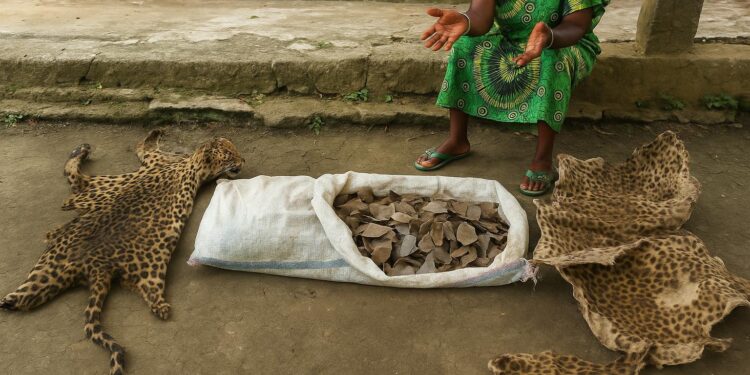Heightened Wildlife Enforcement in Likouala
On 25 August 2025, gendarmes in Impfondo, Likouala’s administrative capital, intercepted a forty-year-old Congolese woman transporting two freshly cured panther skins alongside several kilogrammes of giant pangolin scales and claws. Officers recorded the seizure at a roadside checkpoint before escorting the suspect to regional headquarters for questioning.
The arrest resulted from a coordinated sweep involving Likouala gendarmerie units, the Departmental Directorate of Forest Economy, and the Wildlife Law Enforcement Support Project, PALF. Investigators used unmarked vehicles and discreet informants, aiming to disrupt trafficking corridors that crisscross riverine settlements near the Cameroon and Central African Republic borders.
“She will be presented to the public prosecutor so that the law can follow its course,” explained Colonel Yves Kiyiri, chief of staff for the Likouala gendarmerie region. Under applicable statutes, the defendant faces two to five years in prison and fines of up to five million CFA francs.
Legal Framework Protecting Iconic Species
Law 37-2008 on Wildlife and Protected Areas, enacted on 28 November 2008, offers the legal backbone for such prosecutions. Article 27 explicitly bans the import, export, possession and transit of panthers, giant pangolins and their trophies unless a rare scientific or breeding derogation has been granted.
The classification “integrally protected” affords these charismatic species the highest conservation status in the Republic of Congo. Authorities therefore treat any commercial activity, however small, as an offense against national heritage, aligning criminal procedure with broader objectives of biodiversity preservation and socio-economic development agendas.
Recent Court Signals and Deterrence
Precedent reinforces the message. On 26 June 2025, the Impfondo Criminal Court sentenced three men convicted of holding one panther skin and substantial pangolin scales. One received three years’ imprisonment; the other two, two years each. Together they owed one million CFA in fines and three million in damages.
Magistrates involved in that case underscored the deterrent effect of swift adjudication, noting that public confidence rises when verdicts are delivered within weeks of arrest. The pattern suggests institutional willingness to apply existing statutes consistently rather than rely on periodic amnesties or symbolic warnings.
Socio-Economic Drivers and Community Outreach
Yet courts alone cannot resolve the socio-economic pressures that fuel trafficking. Likouala’s vast mosaic of forests, rivers and seasonal roads creates logistical challenges for oversight while offering discreet channels to markets craving exotic skins and scales for decoration, fashion accessories or traditional pharmacopoeia.
Local couriers, often earning irregular incomes from fishing or small-scale logging, become vulnerable to recruiters promising quick financial rewards. Officers interviewed after the latest seizure observe that many first-time offenders underestimate the penalties enshrined in law 37-2008, assuming wildlife crimes attract only modest administrative fines.
Conservation officers stress that community outreach—school talks, radio segments, and village debates—remains essential for transforming perceptions. By framing living wildlife as a renewable asset underpinning future tourism, rather than a short-term commodity, educators aim to plant seeds of stewardship that ultimately reduce enforcement costs.
Should rehabilitation programs accompany custodial sentences, officials say, convicted traffickers could become advocates for legal hunting quotas of non-protected species, turning personal experience into preventive testimony across river settlements.
Synergies Strengthening Enforcement Capacity
The Impfondo operation also illuminates the benefits of inter-agency synergies. Gendarmerie patrols bring legal authority to arrest and secure crime scenes, while Forest Economy technicians authenticate exhibits through morphological analysis, enabling prosecutors to build watertight dossiers unlikely to collapse under procedural scrutiny.
PALF supplies discreet logistical advice, ranging from covert surveillance techniques to courtroom monitoring. Its long-term presence in northern Congo has fostered trust with both traditional chiefs and urban magistrates, helping translate field arrests into final judgments without overshadowing sovereign responsibilities of national institutions.
Senior civil servants in Brazzaville argue that improved conviction rates demonstrate pragmatic reform rather than a punitive turn. They cite better training curricula for rural judges, clearer sentencing guidelines, and enhanced budgetary lines for wildlife units as evidence that enforcement advances alongside rule-of-law consolidation.
Diplomatic and Developmental Implications
For foreign partners tracking governance indicators, such procedural maturity can shape perceptions of investment risk. Wildlife law enforcement, though sector-specific, signals wider administrative predictability, an attribute often factored into bilateral aid packages and private-sector feasibility studies.
Diplomats note that Congo-Brazzaville’s credibility in multilateral biodiversity forums improves every time seizures lead to court-certified disposals rather than warehouse stockpiles vulnerable to theft. Tangible outcomes may strengthen proposals for eco-tourism corridors and climate-linked financing currently under consideration in regional planning documents.
The government’s wildlife strategy also dovetails with President Denis Sassou Nguesso’s stated ambition to align natural-resource management with the African Union’s Agenda 2063. By coupling deterrent sentences with public education, agencies attempt to balance ecological imperatives against legitimate aspirations for rural livelihoods.
As the accused awaits arraignment in Impfondo, conservationists, jurists and diplomats alike will monitor proceedings that encapsulate a broader national objective: safeguarding biodiversity while reinforcing state authority. The forthcoming verdict will therefore carry resonance beyond the courtroom, echoing through policy discussions in Brazzaville and partner capitals.












































